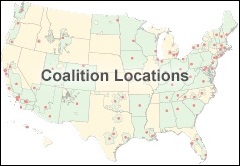by Brianna Crandall — December 5, 2014—The U.S. Department of Energy’s (DOE) Clean Cities program recently welcomed another major partner in the effort to reduce the nation’s dependence on petroleum — the brand-new Tampa Bay Clean Cities Coalition. Through its network of nearly 100 coalitions across the country, the Clean Cities program brings together stakeholders to increase the use of alternative fuel and advanced technology vehicles, reduce idling, and improve fuel economy.
Becoming a member of Clean Cities is not a simple process, points out DOE; the designation ceremony was the culmination of two years of hard work. Communities interested in establishing a coalition first gather together local stakeholders, including vehicle fleet managers, policymakers, utilities, alternative fuel suppliers, vehicle manufacturers, and trade groups. This group, led by a coordinator, then creates a strategy specific to their area. By researching the local market, setting goals, and developing action items, they create a path forward to help their region use less oil in transportation.
Fortunately, Tampa Bay Clean Cities has a strong foundation on which to build, says the Department. Its host organization, the University of South Florida, is very supportive of its efforts, with the University president welcoming attendees to the designation ceremony. The coalition has more than 200 stakeholders, many of whom have made considerable investments in alternative fuel vehicles. For example, Tampa International Airport has a compressed natural gas (CNG) fueling station and plans to convert nearly three-quarters of its fleet to CNG over the next 10 years. TECO Energy, the local utility, has installed 12 charging stations for plug-in electric vehicles (PEVs), as well as adopted PEVs and CNG vehicles in its fleet.

The Coalition is reportedly committed to educating stakeholders on all aspects of alternative fuels. To increase public awareness, it organized National Plug-in Day events and an alternative fuel vehicle expo. The coalition also hosted a training to help first responders learn the appropriate responses to accidents involving CNG vehicles. Other outreach efforts have included lectures on the sustainability of biofuels, a CNG maintenance facility tour, and Webinars on incentives for purchasing alternative fuel vehicles.
The Tampa Bay Clean Cities Coalition estimates that it will displace nearly five million gallons of petroleum in 2014 alone using the variety of strategies it has developed to minimize the use of oil in Florida.
In 2013, Clean Cities reached the milestone of reducing one billion gallons of petroleum in a single year for the first time, with the fundamental efforts of local coalitions. A map with the location of all the local coalitions is featured on the Clean Cities Web site, which contains numerous other resources.




